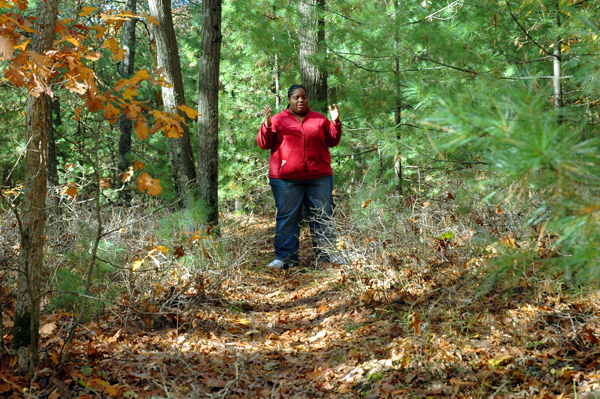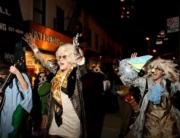
Student Pearl Quick in the woods of Henry David Thoreau's Walden Pond (Adrian Martinez)
Directed by Roland Legiardi-Laura, Edwin Martinez, Deborah Shaffer & Amy Sultan
Produced by Legiardi-Laura, Martinez, Shaffer, Sultan, Jill & Jim Angelo
Released by Dialogue Pictures
USA. 87min. Not rated
Three poetry teachers—Amy Sultan, Joe Ubiles, and Roland Legiardi-Laura—have led a “radical poetry” workshop they call Power Writing at University Heights High School in the Bronx (on the beautiful Stanford White-designed campus of my college alma mater) for over 500 students since 2002. As artists-in-the schools, they teach a full curriculum centered on the motto “If you don’t learn to write your own life story, someone else will write it for you.” Breaking the minority students into small groups, the teachers provide encouragement with lots of constructive criticism, while urging them “to get the hell out of the Bronx,” with field trips to out-of-town colleges and the teachers’ downtown apartments. Mixing interviews, formal performances, and cinema vérité, the documentary follows three participants over four years in class and through their complicated home lives. They call themselves “The Tripod,” and prepare for the Urban Word Slam in Manhattan, with a trio piece whose refrain is “I’m sick and tired—of being broke,” but their issues go beyond being young, gifted, and poor.
At home, 18-year-old Karina Sanchez cooks for her five younger siblings (and another is soon on the way). Beyond her resentments against her mother—“All we do is fight”—she performs a moving poem about her mother hitting her. Pearl Quick revels that her classmates don’t “just see me as an overweight girl.” The walls of her room are full of inspiring Oprah-esque quotes, and she’s brimming with determination to get into Sarah Lawrence College over any competition: “What kinds of people are better than me?” Doo rag-wearing Anthony Pittman enthuses that “When I write, I’m somewhere else—it’s my exit pass” from his neighborhood. (He copes with an imprisoned drug dealer father and violent threats on the streets.) After he gets in trouble at school, he turns the disciplinary lesson into a performance piece about being forced to grow up. His teachers are sympathetic, though his two friends get exasperated with his behavior. He wistfully reflects “Pearl is always going to be my conscience. Karina is always going to be my heart.” But Karina warns that he is “our weakest link.”
Unlike Greg Jacobs and Jon Siskel’s Louder Than A Bomb on poetry slam participants in Chicago, this film revealingly follows the soberly maturing participants for months beyond the passing thrill of the competition. Pearl accepts that she has to undertake more college preparation at a community college, under the mentorship of a program graduate. Another beating from her mother drives Katrina out to move in with a new boyfriend, and Anthony’s trajectory is the most tragic.
The Power Writing teachers focus more on poetry as a personal tool, unlike Laura Brownson and Beth Levison’s Lemon, a cautionary tale of slam poetry as a career move, currently making the festival rounds. Legiardi-Laura urgently tells the next year’s class that vocabulary is “a weapon in your life.” Ubiles optimistically wants his students “to pass the test of life: literal, ethical, conscious human beings who use their information to change the world.” Though the film tries too hard to put a positive spin on the program’s impact on the Tripod, To Be Heard goes beyond other kids-in-competition documentaries by putting the hard work of teachers and their students into a more realistic context and balanced perspective about the impact of the arts on teenagers’ lives.






Leave A Comment